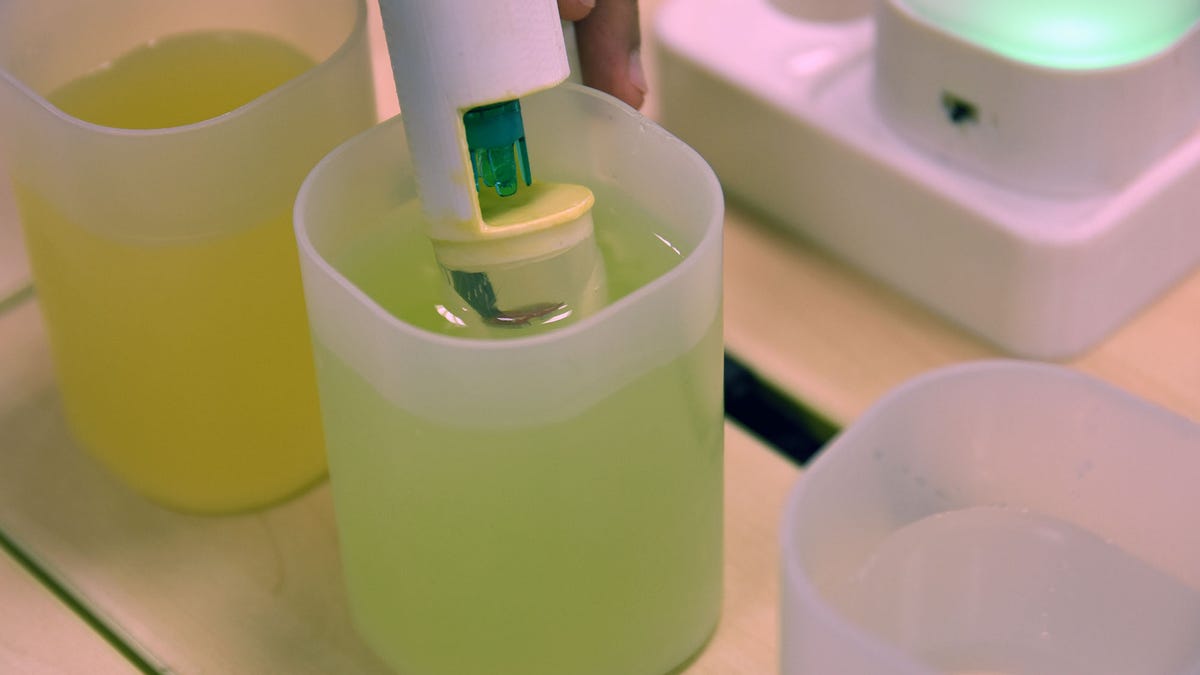Singapore scientists teleport lemonade over the internet
Sending taste over the web could become a thing sooner rather than later, according to researchers.
Fancy a world where you can drink something cool and instantly share it with all your friends? That could happen sooner than you think. Researchers just need to iron out the kinks.
Scientists at the Keio-NUS CUTE center -- which stands for Japan's Keio University and the National University of Singapore Connective Ubiquitous Technology for Embodiments -- have figured out how to detect the taste and color of lemonade and send it over to a specially made tumbler filled with plain water.
The tumbler uses an LED light to mimic the color of the lemonade, while metal strips embedded at the top of the cup transmit the taste to your tongue while you drink the now sour-tasting water.
It's not at the water-into-wine level just yet, in case you're wondering.
Here is a device used in the Virtual Lemonade project.
"We chose lemonade because sourness is one of the sensations we can simulate using an electric current," said Nimensha Ranasinghe, one of the four members of the project and a research fellow at NUS. He added that the simulations are not just limited to that taste. It's also possible to simulate sweet, salty or bitter flavors.
The project, which the researchers began more heavily promoting in late March, isn't just about replicating the taste. It's also an experiment to see if it's possible to "create new experiences like communicating with beverages or transferring of experiences remotely," said Ranasinghe.
Using electrical currents to stimulate flavors isn't really new. Scientists such as Ranasinghe have been working on digital tastes for a while now. And he's not alone. There are other teams in Japan and the US also working on tricking your tongue into tasting flavors.
The technology works by using first dipping a sensor stick embedded with a pH level and color sensor into the actual drink, and then transmitting the data to the aforesaid tumbler. Electrolytes then stimulate your taste buds. And as I found out, you don't really need to actually drink the water to do so. Simply sticking your tongue on the dual metal strips automatically transmit the taste to your tongue. The electrical current, measured in microamps, isn't big enough to shock you or cause you pain.
It's not the most comfortable way to drink.
It's an odd experience because sticking your tongue to the outside edge of a cup is not how you'd normally drink. (If you do, I'm not judging you.) The sourness is definitely there and appears similar to the real lemonade I tried first. Ranasinghe said the team is still working out how to put the metal strips at the top of the tumbler for a more natural drinking experience.
The tumbler can also adapt to different degrees of sourness, so I went from a mild lemonade to a stronger one, which left a lingering sour taste on my tongue for the next hour or so. Still, it's a better experience compared with the last time I put my body on the line for science, which ended up pretty much wrecking me when I tried out an electrical muscle-stimulation suit.
Ranasinghe said commercialization of the project will take some time because the team is also working on transmitting smells to make the experience even more realistic. (Taste and smell combined are how we perceive flavors.) There are plans to make a spoon for use in hospitals for patients who need to decrease the amount of salt in their food but still want the taste.
It's Complicated: This is dating in the age of apps. Having fun yet? These stories get to the heart of the matter.
Batteries Not Included: The CNET team reminds us why tech is cool.


